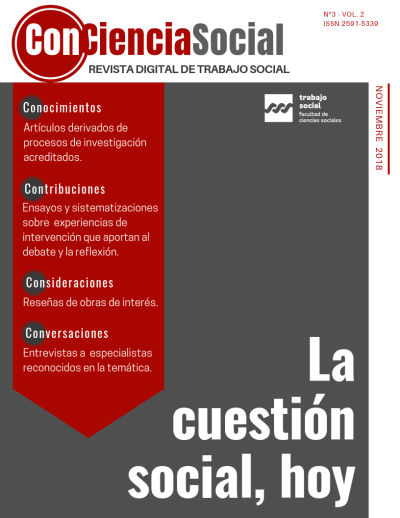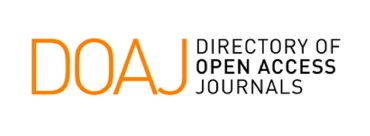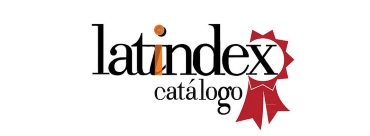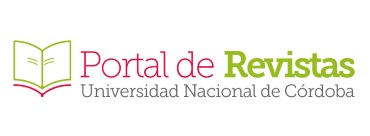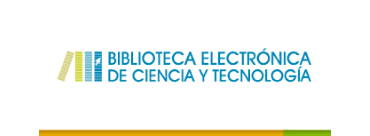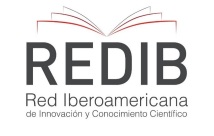The construction of the representative system of social movements
Keywords:
social movements, structuring factors, representative system, process of integrationAbstract
The article deals with the processes of formation and support of social movements in contexts of absence of rights, social and material inequality, that is, in historical conjunctures where the forms of manifestation and confrontation of the social question and the struggle for their recognition are transformed (Iamamoto, 1997). How is a social movement constituted? What factors contribute to the process of collective structuring and unity of a social movement in a conflict field? These questions are addressed in accordance with the research carried out on the case of the Union of Grassroots Organizations for Social Rights in Córdoba (the Union) (1992-2004). From the theoretical tools on collective action offered by Melucci (2001), a conceptual key is explored and proposed, which, since our investigation, was important for the understanding of social movements: the process of construction of the representative system in relation to the integration of the social movement and its action in a conflict field. In turn, it is proposed that the analysis of the variation in the meaning of representation exercised by those who are the protagonists of collective action is fruitful for the study and interpretation of the trajectory of different social movements. In this way, it contributes to the understanding of the integration process as well as the weakening of the system of collective action in a field of possibilities and limitations.References
Aquin Nora y González Cristina (1998): Mesa de concertación de políticas sociales ¿Modelo para replicar? Espacio, Buenos Aires.
Castel, Robert (1997): La metamorfosis de la cuestión social. Una crónica del salariado, Paidós, Buenos Aires.
Cohen, Jean y Arato, Andrew (2000): Sociedad civil y teoría política. Fondo de cultura Económica, México. DF.
Iamamoto, Marilda V (1997): Servicio Social y División del Trabajo. Cortez Editora, San Pablo.
Melucci Alberto (2001): Vivencia y Convivencia. Teoría social para una era de la información. Editorial Trotta, Madrid.
----------------- (1994): ¿Qué hay de nuevo en los nuevos movimientos sociales? En Laraña, Enrique y Gusfield, Joseph (Coords.): Los Nuevos Movimientos sociales. De la ideología a la identidad (pp. 119-150), Centro de Investigaciones Sociológicas, Madrid.
Rodríguez Marcela y Taborda Alberto (2010): Análisis de Políticas Públicas. Formación, estilos de gestión y desempeño: Políticas de vivienda. Córdoba 1991-2007. Editorial Brujas, Córdoba.
Servicio Habitacional y de Acción Social (1993): Las villas de emergencia en Córdoba. Estudio de aspectos cuantitativos de su población y su situación de hábitat. Conciencia Social 1(1), 41-50. Escuela de Trabajo Social. Universidad Nacional de Córdoba, Córdoba.
Servicio Habitacional y de Acción Social (1992): Unión de organizaciones de base por los derechos sociales. Estudio diagnóstico de la situación de empleo e ingreso de las organizaciones que integran la unión de organizaciones de base por los derechos sociales. [Investigación e informe]. Córdoba.
Vanella, Ricardo (1997): Construcción de una estructura de autogobierno. La Mesa de concertación de Políticas Sociales de Córdoba (Argentina). Desarrollo de Base Fundación Interamericana 21(1), 31-40. Oficina de Aprendizaje y divulgación de la Fundación Interamericana, Arlington.
Fuentes electrónicas
Melucci Alberto (1999): Acción Colectiva, Vida cotidiana y Democracia. El colegio de México DF. Teoría de la acción colectiva, identidad y movilización en los movimientos sociales. Disponible en: http://www.ses.unam.mx/docencia/2014II/Melucci1999_AccionColectivaVidaCotidianaYDemocracia.pdf Fecha de última consulta: 16-02-18
Otras fuentes consultadas:
Estatuto Social de Unión de Organizaciones de Base por los Derechos Sociales –UOBDS- (1999). Título I. Provincia de Córdoba.
Downloads
Published
Issue
Section
License
Aquellos autores/as que tengan publicaciones con esta revista, aceptan los términos siguientes:Los autores/as conservarán sus derechos de autor y garantizarán a la revista el derecho de primera publicación de su obra, el cuál estará simultáneamente sujeto a la Licencia de reconocimiento de Creative Commons que permite a terceros:
Compartir — copiar y redistribuir el material en cualquier medio o formato
Adaptar — remezclar, transformar y construir a partir del material para cualquier propósito, incluso comercialmente.
La licenciante no puede revocar estas libertades en tanto usted siga los términos de la licencia.Los autores/as podrán adoptar otros acuerdos de licencia no exclusiva de distribución de la versión de la obra publicada (p. ej.: depositarla en un archivo telemático institucional o publicarla en un volumen monográfico) siempre que se indique la publicación inicial en esta revista.
- Se permite y recomienda a los autores/as difundir su obra a través de Internet (p. ej.: en archivos telemáticos institucionales o en su página web) después del proceso de publicación, lo cual puede producir intercambios interesantes y aumentar las citas de la obra publicada. (Véase El efecto del acceso abierto).
Los derechos de explotación comercial (Copyrigth) quedan reservados para los autores.

